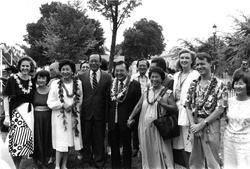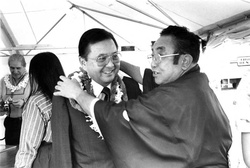As members of the public pay their last respects to Senator Daniel K. Inouye, the Center for Folklife and Cultural Heritage remembers the honor of his participation in three Center projects: the Hawai‘i Folklife Festival (1989), the National World War II Reunion (2004), and the “Asian Pacific Americans: Local Lives, Global Ties” Festival program.
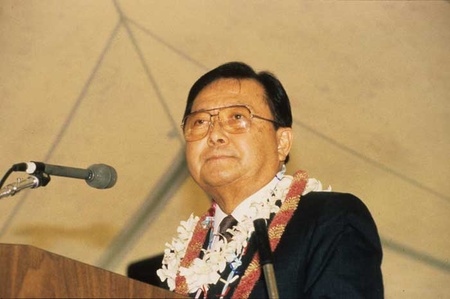
The Senator, who passed away on December 17, 2012, has left behind a remarkable legacy that includes military service and a Congressional Medal of Honor, a half-century in national politics, and a lifetime commitment to championing the causes of his home state of Hawai‘i and furthering the civil rights of all Americans.
This interview with the Senator was recorded in 2004 on the occasion of the National World War II Reunion. In this segment, which is 13 minutes in length, he describes the transformative impact of WWII on the course of his life and he shares several poignant stories recounting the wisdom of his father Hyotaro Inouye.
CFCH media director Charlie Weber* recalls this interview and his interaction with the Senator:
It’s not true that the camera sees all. Much of the time, the best and most meaningful stories aren’t captured, but are told off the cuff and after the cameras are returned to their cases. My visit with Sen. Daniel Inouye went like that. I’d visited him with a film crew in the spring of 2004. We wanted some good stories to help commemorate the dedication of the National World War II Memorial in Washington.
I’d looked forward to our talk for weeks, as I am Japanese American and my father was a veteran of the war. The senator was a wonderful storyteller, with such an easy way about him. It was one of the easiest conversations I’d ever had. The way he saw things, his experience as a soldier in the 442nd Regimental Combat Team had shaped his life. His colleagues in that fighting force had “taught him what brotherhood was all about, what comradeship was all about.” He told us that they had “taught him how to be a man.”
So, on that day, while the camera crew was packing up, the senator took me into his office. He held up a family photo. Very gently, he told me that everything he had earned in life, he owed to the men of the 442nd. We sat down and he shared one last story, something that had happened after he returned to his hometown on Hawai‘i.
The Army had ordered a car to take him to his parents’ home. He was returning as an officer, wounded in action, missing an arm. Inouye made to get into the front seat. The driver, a white sergeant, saluted, and told him very plainly that, no, he was to sit in the backseat. Inouye complied. Near the end of their time together, as they neared Inouye’s neighborhood, the sergeant told him how things were to go: “When we get to your parents’ home, you will not open the door of the car. You will wait for me to open it for you. When you come out, you will look me in the eye. I will salute you. You will not salute me. And you will tell me, ‘that will be all, sergeant.’”
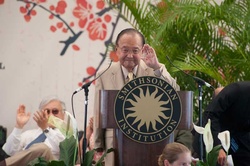 Smithsonian Folklife Festival "Asian Pacific Americans: Local Lives, Global Ties" program, 2010. Photo by Richard Strauss
Smithsonian Folklife Festival "Asian Pacific Americans: Local Lives, Global Ties" program, 2010. Photo by Richard StraussWhen they arrived, the senator’s parents came out to the front yard. They had been waiting at the window for their son. In front of his mother and father, Inouye did as he was told. The sergeant gave him his crispest salute. Inouye looked him in the eye and nodded, “That will be all, sergeant.”
Fifty years later, sitting in his office in Washington, D.C., the senator confided that in quiet moments, he often thought of that sergeant. And now, so do I. About the man’s eagerness to show Inouye’s parents the respect their son had earned as a veteran and a member of a highly decorated unit of World War II. What a gift from one soldier to another.
Note: Charles Weber is media director at the Center for Folklife and Cultural Heritage. In addition to teaching field research documentation methods and history, he has covered the Smithsonian Folklife Festival extensively since 1996 and produced award-winning video projects in locations across the U.S. and the globe.
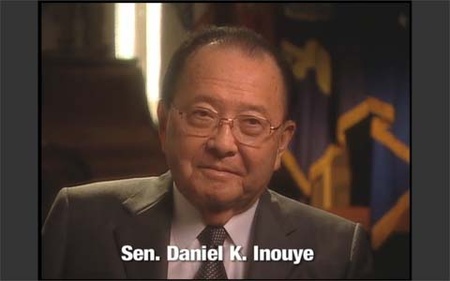
* This article was originally published on the Smithsonian Folklife Festival Blog on December 20, 2012.
© 2012 The Center for Folklife and Cultural Heritage


